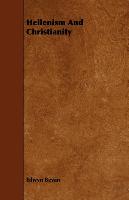Hellenism and Christianity
BücherAngebote / Angebote:
PREFACE THE essays composing this book were written at different times for different occasions. Yet I venture to believe that, put together in a single volume, they will present a mental unity-a single body of interests, observations, and ideas, which is one individuals reaction to the spectacle of the universe. In the history of mankind, during these last few thousand years, in which mankind has begun to have what may be called in the more special sense a history, the two predominant factors appear to be, the rise of rationalist culture, first in the ancient Greek world and then again in modern European civilization, and the entrance of the Christian life into the world process. In the first essay I have tried to show the significance of rationalist culture in its relation to Eastern forms of civilization, and correct what I believe to be some common misapprehensions. Perhaps some explanation is required why this essay in describing the civilization of the West says nothing about Christianity. This is not because I think Christianity an unimportant element in the life of mankind it is because the modern West seems to me still for a large part to require cnnversion to Christianity. Such genuine Christianity as has existed in the West has no doubt exerted an incalculable influence in different Hellenism and Christianity degrees over the whole field, but when men contrast our modern Western civilization with Eastern civilizations, when they lay stress upon our standards of political life, our intellectual emancipation, our science, our mastery over the forces of Nature, they are pointing rather to the Hellenic, rationalist, factor in our civilization than to the Christian. It is that which constitutes, if I may so express it, the Westernness of the West. I once heard a living politician, speaking on a platform, claim for Christianity, amongst other things, credit for the invention of lyddite shells. That seems to me a confusion. The two following essays deal with the ancient Hellenism. Bacchylides raises the problem why rationalist culture in its first Hellenic embodiment met with an arrest. In the Greek Anthology, of which the third essay treats, there is brought before us an image of theGrcok mind in its later literary activitics, and we are left listening to the ancient voice calling out of the perished - centuries its ever-recurrent burden, Let us eat and drink and follow our light loves, for to-morrow we die. In the next two essays we look at the first entrance of the Christian life into this world which fears death, the distinctive Christian idea of the Redeemer. Then we pass to the time when the old paganism is on the point of extinction and the new wrld of medieval Christianity about to be born, to the great typical figure of Augustine on the threshold of the two ages. In the eighth and ninth essays some questions of moral value connected with the Christian view of life are discussed. If the essays hitherto have looked backwards along the human track through time and tried to discover the significance of G Preface Christianity by glancing at some of the things that went before it, or that have accompanied it up to the present, the tenth and eleventh essays consider the question whither the whoIc proccss is tending, since our idca of thc significance of any factor in the world movement must bc determined as much by our forecast of what it is leading to as by our view of its antecedents. Since the essay on Human Progress was written two notable contributions have been made to the discussion of this question, Professor Burys book on The Idea of Progress and thc Rornanes Lecture given in 1920 by the Dean of St. Pauls...
Folgt in ca. 15 Arbeitstagen




